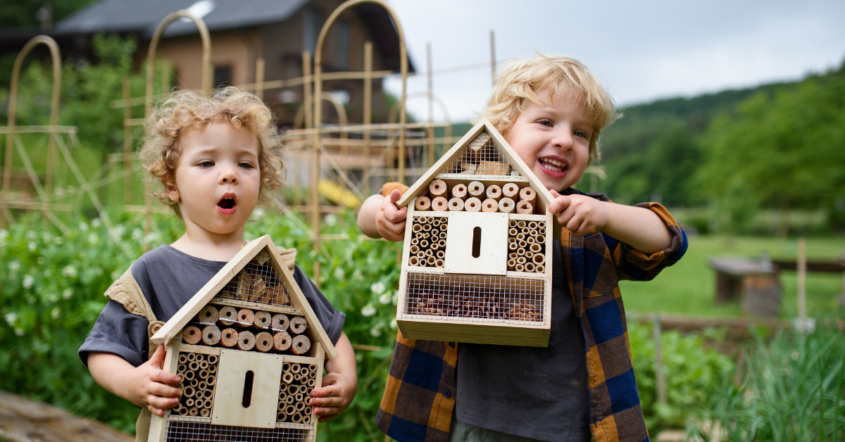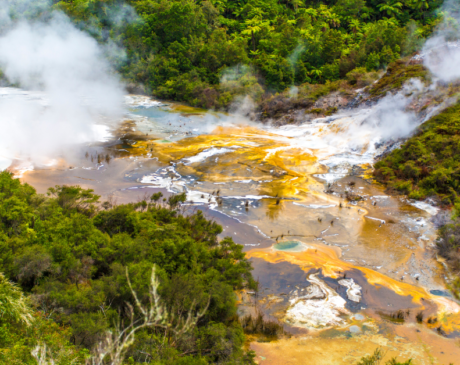What is an Ecovillage and Why Live in One?

An ecovillage is an ecological settlement, a place where a few or several people live in pursuit of a life with a low environmental impact and strong social cooperation. These places are founded on the four dimensions of sustainability: social, cultural, ecological, and economic. Ecovillages can be established in rural areas, on the coast, or even within urban centers.
Discover what defines an ecovillage, its main characteristics, differences between them, how to visit them, and the reasons to consider living in one.
Main Characteristics of an Ecovillage
Ecovillages are more than just green initiatives; they are communities for those seeking a life of collaboration with others and a deep connection to nature. In contrast to today’s neighborhoods and cities often developed without coordinated planning or shared goals, ecological communities adhere to collectively decided guidelines.
These settlements serve as models for small-scale management and coexistence, facilitating the process of adaptation for the well-being of the community. According to the Global Ecovillage Network, there are two primary ecovillage formats:
- Traditional ecovillages: Rural spaces that opt to redesign their systems in pursuit of sustainable development.
- Intentional ecovillages: Where individuals with shared purposes and visions come together.
Common Characteristics of These Settlements
Key Elements:
- Objectives: These objectives form the foundation of the community, providing direction and cohesion. Various objectives can guide the group, ranging from agriculture and spirituality to social causes, among others.
- Intelligent Resource Utilization: The skillful use of materials readily available in the vicinity, aimed at reducing costs and environmental impacts, is fundamental. Ecovillages often incorporate permaculture concepts, with a focus on caring for the land, people, and the future.
- Regeneration: Preservation alone is insufficient; regeneration is equally necessary. Initiatives like agroforestry, reforestation, and vegetable gardens are common, aimed at rejuvenating threatened forests and wildlife.
- Dialogue and Communication: Regardless of their organizational structure, transparency is essential within these communities to peacefully and constructively resolve conflicts.
- Fostering Observation and Learning: Ecovillages are centers for continual learning, encouraging residents to explore and evolve, acknowledging that there are no pre-packaged solutions.

Challenges Exist
However, it’s important to recognize that, like almost everything in life, theory can differ from practice. Many communities encounter problems due to differing histories, opinions, and difficulties in resolving conflicts. Many ecovillages disband because of such disagreements.
To mitigate these issues, formal agreements recorded on paper can serve as a resource for consultation and guidance when problems arise.
How to Live in an Ecovillage
Numerous places welcome new members, each with varying admission criteria. Some require you to purchase or rent a space, while others retain ownership of all properties within the community.
Before moving to an ecovillage, consider these essential tips:
- Avoid making hasty judgments about the project. Idealizations can vary significantly from reality.
- Understand the community’s objectives thoroughly. Research through websites and conversations with residents or former members to ensure your goals align.
- Explore volunteer programs if available. Spending time with the community before committing to residence allows you to assess compatibility.
- Travel light, both in terms of material possessions and emotional baggage. Be open to new experiences and the community’s way of life.
- Embrace the spirit of community and service, as ecovillages aim to counter the individualism and competition often found in traditional cultures.
Prominent Ecovillages Worldwide
Some of the world’s most renowned ecovillages include:
- Findhorn Foundation in Findhorn, Scotland, known for its sustainable living practices, organic gardens, and eco-friendly architecture.
- Auroville in Tamil Nadu, India, an international community focused on spiritual growth and sustainable development.
- Damanhur in Piedmont, Italy, famous for its underground temples and emphasis on art, spirituality, and ecological living.
- Earthaven Ecovillage in Black Mountain, North Carolina, USA, a prominent example of ecovillage life with a commitment to permaculture and sustainable living.
- Tamera in Portugal, renowned for its research in sustainable water management and peace-building initiatives.
- Crystal Waters in Queensland, Australia, known for sustainable design and practices, including permaculture and community gardens.
- Solviva in Cape Cod, Massachusetts, USA, focusing on sustainable agriculture and renewable energy solutions.
- Sekem in Egypt, recognized for its holistic approach to sustainable agriculture, education, and community development in the Middle East.
- Las Gaviotas in Colombia, famous for innovative sustainability projects, including reforestation efforts and wind energy initiatives.
These ecovillages have gained recognition for their dedication to sustainable living, community building, and innovative approaches to ecological and social challenges, each contributing uniquely to the global sustainability movement.

How to Volunteer in an Ecovillage
To volunteer in an ecovillage, start by researching ecovillages aligned with your interests and values. Reach out to your chosen ecovillage, expressing your interest in volunteering.
Understand their specific requirements, including the duration of your stay and any associated fees. Prepare relevant skills and knowledge to contribute.
Plan your stay and logistics, such as accommodation and transportation. Engage actively in the community’s daily life and projects while respecting their values and rules.
Learn from the experience and share your knowledge as appropriate. After your volunteer period, reflect on your experience and maintain contact with the community for potential future involvement.



